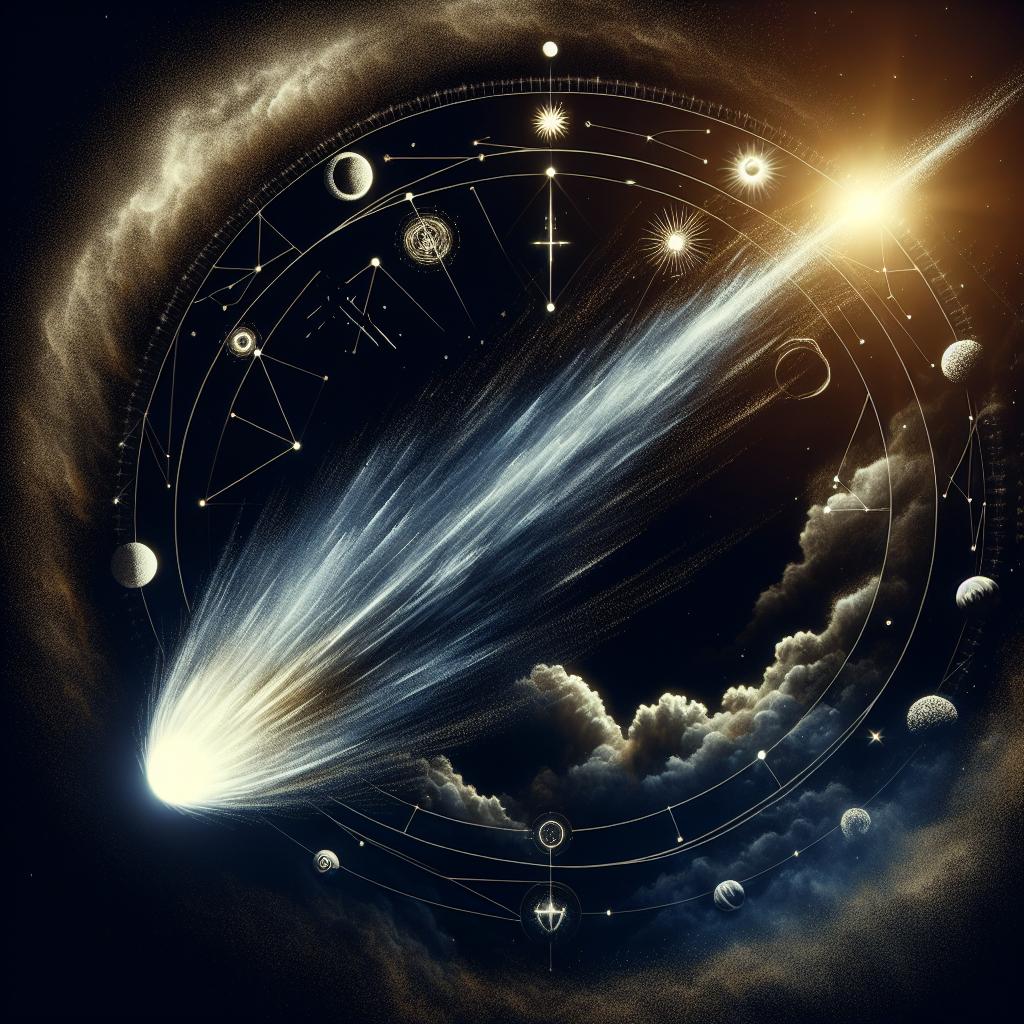
Divine Revelations: Unveiling the Spiritual Significance of Comets in Christian Prophecy
Published: 22 March 2024
Comets: Portents of Doom or Indicators of Youth?
Comets have long fascinated and often horrified mankind. They seem to come from nowhere, and disappear just as suddenly. Their tails seem to dwarf other heavenly bodies. But what are comets? Are they portents of disaster or indicators of youth? In this article, we will explore these questions from a staunchly conservative Christian perspective.
1. What are comets?
Comets are "dirty snowballs" or "dirty icebergs" that revolve around the sun in highly elliptical orbits. They are usually a few kilometers across and contain dust and ice, which is not just frozen water but also frozen ammonia, methane, and carbon dioxide. When comets pass close to the sun, some of the ice evaporates, forming a coma and tails. The coma is typically 10,000–100,000 kilometers wide, and the solar wind pushes a tail of ions directly away from the sun. Solar radiation also pushes away dust particles to generate a second tail that curves gently away from the sun and backwards.
2. What does the Bible say about comets?
The Bible teaches that the universe was made by a God of order, who gave mankind dominion over creation. It was the biblical worldview that led to the science that explained comets. In Genesis 1:14-19, God tells us that He made the sun, moon, and stars on Day 4 of Creation Week, which aligns with the estimated creation date of around 4000 BC. The Hebrew word for star, "kokab," refers to any bright heavenly object, which presumably includes comets as well.
3. What is the age of comets?
The features of comets make perfect sense in a biblical timescale but pose a significant problem for evolutionists who believe in billions of years. Comets lose so much mass every time they shine that they could not have been orbiting the sun for billions of years. The short life of comets is a testimony to the short age of the solar system and planets.
4. Do comets have any significance beyond their scientific explanation?
While comets have often been viewed as portents of disaster throughout history, it is important to approach their significance from a biblical perspective. Instead of trying to tell fortunes from heavenly bodies through astrology, we should seek information from their Creator in His written Word, the Bible. The Bible provides us with a framework for understanding the purpose and significance of celestial bodies, including comets.
5. What do comets teach us about God's creation?
Comets serve as a reminder of God's creative power and the intricate design of the universe. The fact that comets follow predictable paths and exhibit specific behaviors points to an ordered and purposeful creation. The study of comets allows us to appreciate the complexity and beauty of God's handiwork, reinforcing our understanding that the universe was made by a God of order.
6. Can comets be considered indicators of youth?
Comets can indeed be considered indicators of youth when viewed within a biblical framework. Their short lifespan and the loss of mass with each pass near the sun align with the concept of a young solar system. The idea that comets could have been orbiting the sun for billions of years contradicts both observable evidence and biblical teachings.
7. What are some alternative explanations proposed by evolutionists?
Evolutionists propose hypothetical sources to replenish the supply of comets, such as the Oort cloud and the Kuiper Belt. However, these explanations lack observational support and face numerous theoretical difficulties. The Oort cloud, for example, has no direct observational evidence and is considered more of an ad hoc device to explain away the existence of long-period comets. The Kuiper Belt, on the other hand, has not yet discovered any comets within its region, making it an unsatisfactory answer.
8. What can we learn from comets as Christians?
As Christians, we can learn several valuable lessons from comets. Firstly, they remind us of the importance of seeking knowledge and understanding from God's Word rather than relying on superstitious beliefs or astrological practices. Secondly, they teach us about the beauty and complexity of God's creation, highlighting His sovereignty and creativity. Finally, comets serve as a reminder of the shortness of time and the urgency to fulfill God's purposes in our lives.
In conclusion, comets are not portents of doom but rather objects that God created on Day 4 of Creation Week. They provide insights into the young age of the solar system and planets, aligning with both biblical teachings and observable evidence. While evolutionists propose alternative explanations for the existence and lifespan of comets, these explanations lack observational support and face theoretical difficulties. As Christians, we can appreciate comets as indicators of God's creative power and use them as reminders of His sovereignty and the brevity of our time on Earth.
